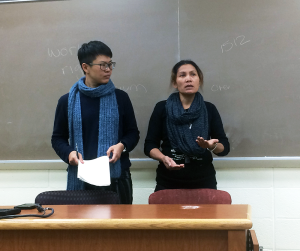
Former Nike worker Noi Supalai (right) and translator described her struggle to recieve fair wages.
While student advocates dispute the current university contract with Nike, Inc., former Nike garment worker and union president Noi Supalai described her struggle to receive fair wages at an event in the Reiss Science Building on Friday. The 44-year-old mother of two came to Georgetown from her home in Northern Thailand as part of a nationwide tour with the United Students Against Sweatshops, a national student-advocacy group.
Cosponsored by the Women and Gender Studies, Theology and Justice and Peace Studies programs, Wearable Justice and the Kalmanovitz Initiative for Labor and the Working Poor, the talk comes after Athletes and Advocates for Worker’s Rights began speaking out against Nike’s alleged unethical business practices in Nov. 2015.
Through an interpreter, Supalai explained she worked at various industrial positions until joining an Eagle Speed Marketing Co. Ltd. factory in Thailand in 2008.
The factory employed about 2,000 workers and formed contracts with brands such as Nike, Columbia Sportswear and The North Face to produce jackets primarily for European and American buyers.
Supalai worked at a sewing machine to assemble jacket pieces from 8:00 a.m. until 5:00 p.m., with a one-hour lunch break at noon. The factory provided lunch and paid Supalai the equivalent of $4 or $5 per day, plus voluntary overtime. For Supalai, the initial wage was reasonable.
However, when Nike requested a large order in 2009, the factory increased worker hours until midnight — sometimes even to sunrise — with minimal breaks.
After working to the brink of exhaustion, the workers found they did not receive their monthly paychecks and began negotiating unsuccessfully with their employer, who explained they could not pay the workers until Nike paid their order.
Without wages, workers could not pay for rent, electricity, running water or food. In response, the factory workers formed a union and elected Supalai president, eventually appealing directly to Nike for help in claiming their wages.
Supalai recounted that, after Nike representatives assured the union they would meet with Eagle Speed managers, the company retracted its orders from the factory instead.Full-time employee of USAS Morgan Currier described that “cutting and running” is an unethical practice in which companies contract with factories abroad but remove orders from firms where workers protest for wage increases and other improvements to pursue lower prices.
“When workers try to form a union, they have power. Brands don’t like that, especially brands like Nike,” Currier said. “So what they’ll do is they’ll up and move their production to a different factory, likely somewhere that has even less regulation.”
Through her experience with negotiations, Supalai argued Nike emphasizes monetary gain over human quality of life.
“They don’t care what they leave behind, our working conditions or the conditions of the workers or what would happen to the factory,” Supalai said. “The only thing they care about is their products and their profits.”
Supalai’s union received compensation for missed wages as well as improved working conditions, including higher quality lunches following joint negotiations with their employer and the Worker Rights Consortium, an independentlabor rights-monitoring organization co-founded by Georgetown in 2000.Nike did not respond to a request for comment. The company has received negative media coverage over worker abuse in its factories since the 1990s.
In 1999, Nike created the Fair Labor Association, an independent monitoring organization auditing Nike-contracted factories for labor violations, to address worker maltreatment issues.
Given Nike’s prominent position within the FLA, Supalai said she does not trust the association.
“There must be an independent organization which monitors a company of Nike so that they can be more responsible to their production line,” Supalai said.
Currently, most major university-affiliated apparel brands including Adidas and Alta Gracia have agreed to the Code of Conduct and thereby apply “adequate monitoring methods,” typically including WRC inspections. Nike has not agreed to the Code of Conduct.
Cal Watson, the Chair of the Georgetown Licensing and Oversight Committee, which advises the university administration in promoting ethical business practices, said a phone meeting with Nike on Monday addressing this exception will allow the committee to deliberate and advise university administration on the issue.
LOC member professor John Kline — who supported Alta Gracia and contributed to a report researching the company’s fair business practices in 2014 — said Nike should be made to sign the code and agree to additional monitoring or forfeit its licensing agreement with Georgetown.
“If Nike refuses to sign the same contract that everyone else does and refuses to be committed to following our Code of Conduct, I will not support any continuation of Nike as a licensee,” Kline said.
Isabelle Teare (COL ’17), a student athlete and co-leader of Athletes and Advocates who coordinated the event, said the event’s result met her expectations.
“I think we had a really good turnout, and I think people walked away with an increased understanding and interest in the issue,” Teare said.
Sophie Kershaw (COL ’18), a student athlete and activist who attended the event, said she hopes students will promote the WRC in monitoring brands like Nike producing garments for the university. She argued that, if students become more aware of WRC’s goals and efforts, more positive progress will occur.
“Small steps like [promoting] the WRC [can help] — these are the people who know the issue and are doing the right thing — so if we can try to find a way to help in that pursuit, that’s the best we can do,” Kershaw said.




















